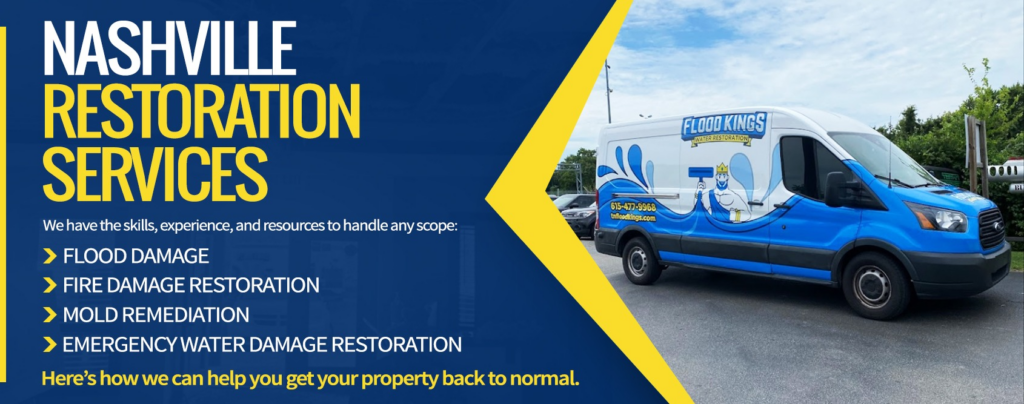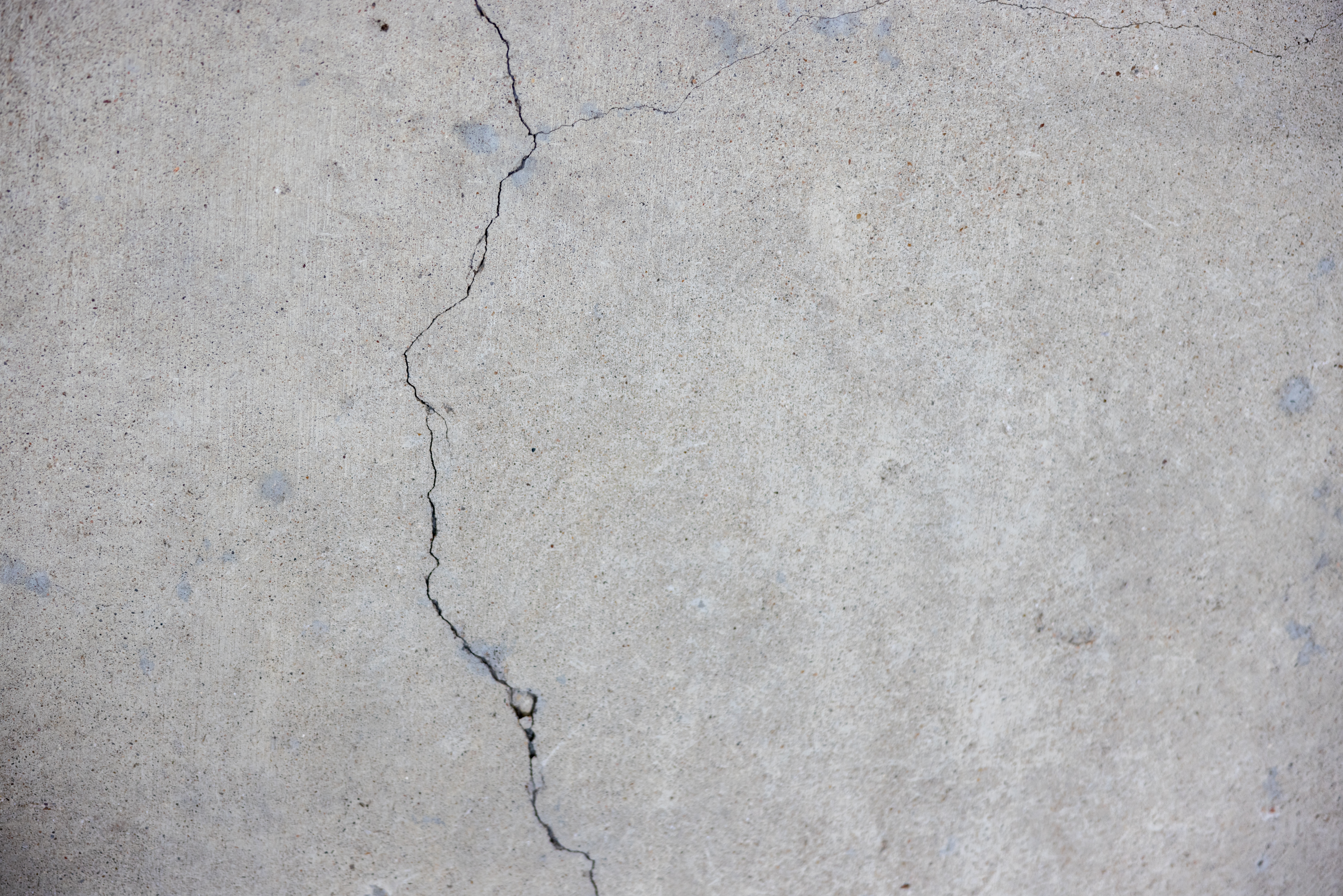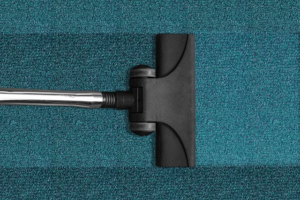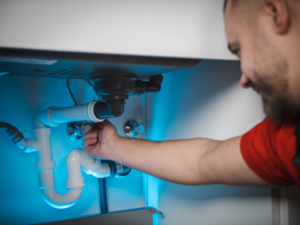Many of us believe that concrete is a hard, dense material that can weather any of life’s storms. So, can water damage concrete?
Yes. Concrete, though rugged, is also quite porous: anywhere from 12-18% of a concrete slab is actually comprised of tiny holes smaller than the diameter of a human hair.
With so many crevices, concrete is very vulnerable to water damage, which is why any cracks must be addressed immediately before they compromise the entire structure. Today, we’ll talk about what causes damage to concrete, how to identify it, and how to patch up your concrete so it’s as good as new.
If you’re concerned about major damage to your concrete, you can always call TN Flood Kings for help! We’re available 24/7 for free estimates, and we work directly with insurance. We’ll guide you through the whole process and ensure that your concrete is laid right.
Potential Causes of Water Damage to Concrete
Concrete is a ubiquitous building material, which means that it encounters water in a variety of ways. However, there are some major culprits that can lead to big trouble if not rectified.
Insufficient waterproofing: Because it’s so porous, concrete needs to be adequately waterproofed if it’s going to last a long time. This is generally done by coating the surface in a thick gel, which, when dried, makes a rubbery coating on the outside of the concrete. You can tell if the coating is still working by pouring a bit of water on the surface; if it beads, that means your concrete is still safe.
However, the waterproofing will break down over time and need to be reapplied, particularly in areas that experience high humidity. It’s also possible for waterproofing to fail if the contractors did not allow the cement to dry completely before applying the coating.
If you’re concerned about the waterproofing on your concrete, TN Flood Kings can assist you in preventing damage and protecting your home.
Tree roots and seismic activity: Tree roots are incredibly strong, and they easily burst apart a layer of concrete over time, which will allow water to infiltrate. This threat is part of the reason why you shouldn’t plant trees right up against your home, as they will push through the soil, causing damage to concrete and other building materials.
Tennessee has two different seismic zones, and while the quakes are generally small, they can still unsettle the foundations of your home and cause the concrete slabs to develop cracks. If not addressed properly, the cracks will continue to grow and encourage further water damage.
Plumbing issues: While indoor plumbing is a modern marvel, too much water in the wrong place can cause foundation damage.
One of the biggest risks to a concrete foundation is plumbing leaks. The water will trickle down to the lowest level and cause standing water in basements or crawl spaces, weakening the structural integrity of your home. Long-term excess moisture from a small leak can wear away at the concrete grains and lead to structural issues.
Heavy rain or flooding from a natural disaster: Water entering your home from a leaking roof or overworked sump pump will soak into any available surface, leading to water-damaged concrete. You should call a pro like TN Flood Kings to handle any major flooding, as flood water can be heavily contaminated and dangerous.
How to Identify Water-Damaged Concrete
The first way to identify a water-damaged concrete floor or foundation is by sight. Does it look wet? Is there a visible sheen or beads of moisture? The affected area may be darker, or it might feel a little soft.
While wet concrete is an obvious sign, another one is cracks in the floor or concrete foundation. As leaks infiltrate, they cause expansion and contraction, which breaks up the cement.
If you notice hairline cracks in the cement, use a moisture meter to confirm that it is due to water damage. You can purchase a moisture meter from a local hardware store; be sure to read the instructions, as different meters have different thresholds.
Another obvious sign of water damage is mold issues: if the cement smells musty or you see small splotches of black, green, or brown, you can assume you have a mold infestation, too.
If you’ve noticed wet concrete or mold on the walls or floor of your basement, it’s time to get help. TN Flood Kings can repair water damage to concrete and take the proper measures to ensure that the problem will never occur again.
We know how much water damage can affect your home or business, which is why we provide free consultations and prompt service so that you can get back to normal as soon as possible. Our IICRC-certified technicians will use the most technologically advanced tools and techniques to repair damage to concrete, as well as rectify any other problems caused by water damage.
Call us 24/7 for assistance with damaged concrete!
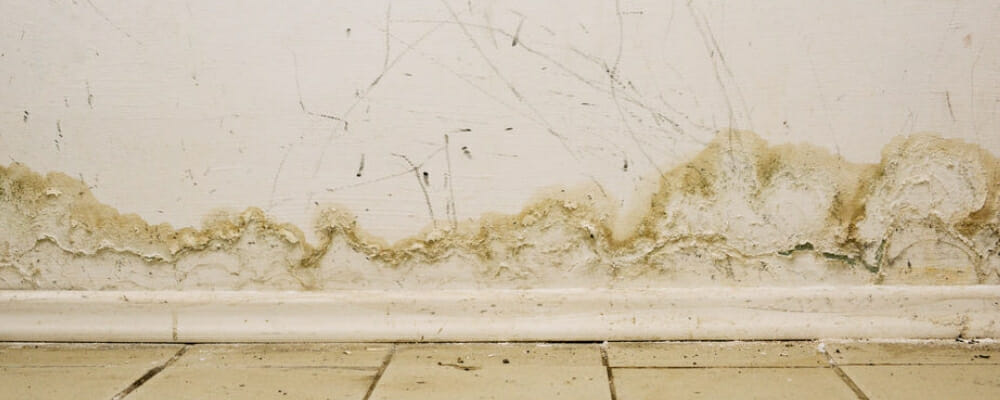
Steps to Repair Wet Concrete
The good news is that it’s not always necessary to replace water-damaged concrete, particularly if the area is relatively small.
If you have large pieces that must be repaired, you should contact a professional water damage remediation company like TN Flood Kings to ensure that the project is done safely and effectively. This is particularly important if you’re dealing with water damage to the concrete foundation of your home: this needs to be fixed by a professional, as a shoddy job here can destabilize the entire structure.
With a little attention to detail and patience, any homeowner or business owner can patch up concrete to prevent further water damage.
Identify the Cause of the Damage
First, you need to know where the damage is coming from and rectify it immediately. Whether it’s a leaking roof, plumbing issues, or a failed sump pump, be sure to get that repaired first before you take on your concrete foundation or floor. If you can’t find the cause, call the water damage restoration team at TN Flood Kings for help.
Demarcate the area of water damage and set up protective barriers so that no one enters the area while you’re working.
Clean the Area and Remove Loose Materials
Working with concrete can be messy, so you’ll want to wear work gloves and old clothes or a protective suit.
Remove standing water in the area with a wet/dry vac or towels. Work safely, and turn off electricity in the area so that you don’t shock yourself.
Once you’ve removed as much moisture as possible, use a cement-safe cleaner and wipe away any dirt or debris. Pull out loose materials like rocks or broken slabs and set them aside so that you have a clean, clear area to repair.
After you’ve gotten rid of all the debris, spray down the concrete flooring to ensure that it is entirely clean and ready to work. Let it dry completely: you don’t want to work on wet concrete, as this will trap moisture and lead to future water damage.
Scrub the area with a wire brush or grinder to create a smooth surface for your mortar.
Apply Mortar and Let Cure
Now, mix up the mortar according to the manufacturer’s instructions. Make a small batch at a time and apply it to the affected area in sections so that it doesn’t cure before you’ve applied it. Use a trowel or putty knife and spread liberally, then allow to air dry for 24-48 hours.
Once the mortar is dry, you can apply a new coat of waterproof sealant to avoid further problems. The sealant will not just ensure that water doesn’t infiltrate the cement; it will also prohibit mold growth, protecting the air quality in your home.
Monitor the Area and Perform Maintenance
Taking proper care of the area can prevent costly repairs from further damage. The most important preventative measures are sealing the concrete and using a dehumidifier. Coat your concrete floors in a waterproof sealant and report any mold issues to a contractor immediately.
Address plumbing leaks as soon as possible so that they don’t trickle into the basement and compromise the structural integrity of your home. TN Flood Kings is always available to assess plumbing problems and ensure they don’t impact your family’s safety.
Call a Professional to Fix A Wet Concrete Foundation
This is not something you should do on your own, as it can cause further damage to your entire home. Instead, contact a professional to treat concrete foundations. This cannot be overstated, as they’re difficult and costly to repair.
Dealing With Concrete Water Damage? TN Flood Kings Is Here to Help! Call 24/7 for an Estimate – We Bill Directly to Insurance!
